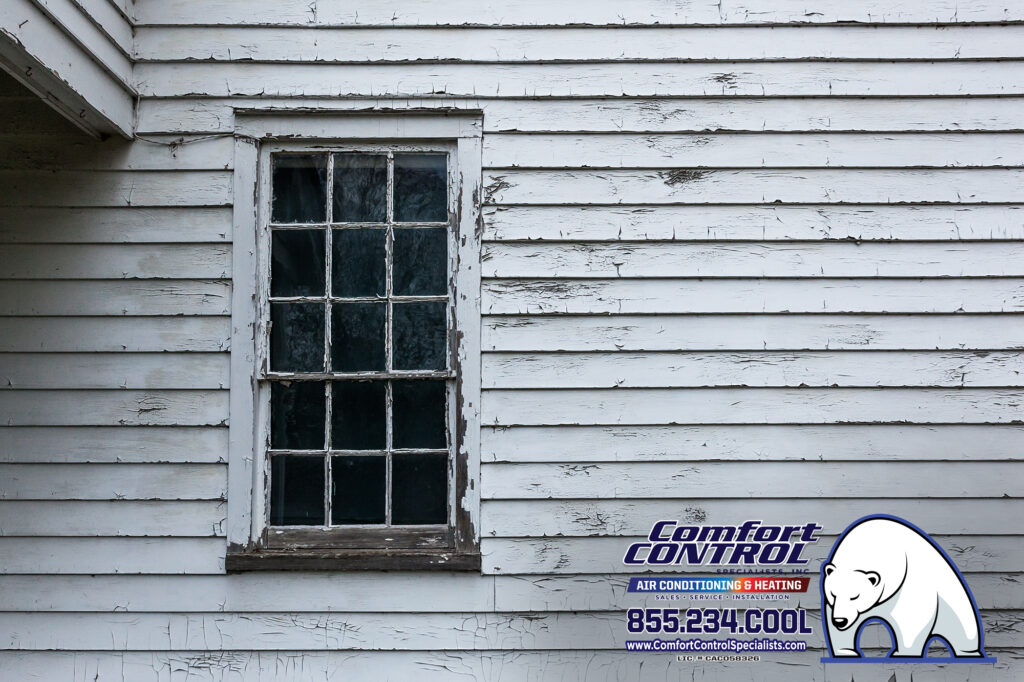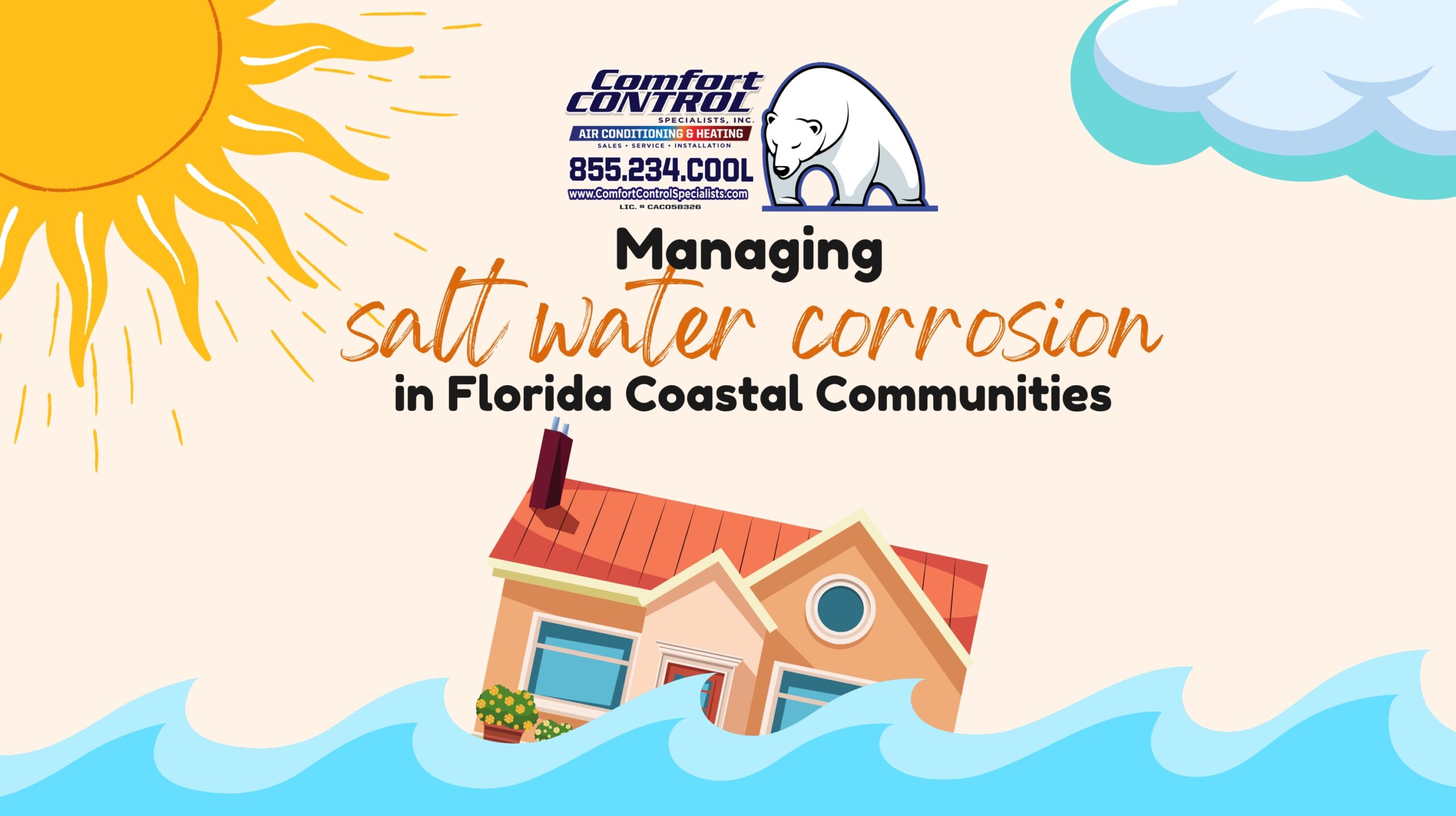[vc_row][vc_column][vc_column_text]
Managing Saltwater Corrosion in Florida Coastal Communities
Florida, lovingly referred to as the Sunshine State, is a paradise teeming with vibrant ecosystems and world-renowned beaches. However, its coastal communities face a persistent and formidable adversary: saltwater corrosion. Understanding the unique challenges this phenomenon presents and employing effective strategies for its prevention and repair are paramount for the longevity of metal fixtures, appliances, and outdoor structures, including HVAC systems.
The Hidden Enemy: Saltwater Corrosion
To appreciate the magnitude of the challenge, it’s crucial to first understand what saltwater corrosion entails. Corrosion refers to the natural process that converts a refined metal back into its more stable ore state. Saltwater corrosion, also known as marine corrosion, is an electrochemical process that results from the combination of moisture, oxygen, and salt, typically found in a coastal environment¹.
The Corrosive Nature of Saltwater
Oceanic saltwater carries abundant quantities of salts, primarily sodium chloride. Salt ions can significantly enhance the conductivity of water, allowing it to corrode metal much faster than freshwater. The higher salt concentration, the faster the corrosion process. In coastal environments, even airborne salt particles can facilitate corrosion by depositing onto metallic surfaces².
The corrosion process begins when a metal surface comes into contact with saltwater. The ions in the saltwater interact with the metal’s surface, leading to the formation of an electrochemical cell. This corrosive cell initiates the oxidation process, resulting in rust or other forms of corrosion³.
Implications for Coastal Communities
For coastal communities in Florida, the damage from saltwater corrosion can be significant. It affects not only the aesthetic appearance of buildings but also their structural integrity and the lifespan of their appliances and fixtures. A study by PricewaterhouseCoopers (PwC) found that the cost of corrosion, including prevention, repair, and replacement of infrastructure, is approximately 3.1% of the United States GDP4. With Florida’s large coastal population and infrastructure, the economic impact of saltwater corrosion is substantial.

The Targets: Household Items and Outdoor Structures
It’s vital to identify the susceptible items and structures within Florida households to ensure effective corrosion prevention and management.
Metal Fixtures and Appliances
Coastal homes often incorporate metal fixtures, both interior and exterior, for their durability and aesthetic appeal. Unfortunately, these fixtures are not immune to saltwater corrosion. Similarly, many home appliances—refrigerators, washers, dryers, and ovens—comprise metal components that can corrode over time.
Outdoor Structures
Outdoor structures, such as balconies, railings, patio furniture, and fences, are particularly vulnerable to saltwater corrosion due to their constant exposure to the coastal environment. They bear the brunt of the salt-laden air and, if not adequately protected, can quickly degrade.
HVAC Systems
HVAC systems, a crucial component of Florida homes due to the state’s warm climate, are especially vulnerable to saltwater corrosion. The constant cycling of air can introduce salt particles into the system, corroding both the exterior and interior components. This corrosion can reduce the system’s efficiency and lifespan, leading to costly repairs or replacement.
Prevention: A Proactive Approach
Preventing saltwater corrosion is far more cost-effective than addressing the damage after it occurs. Here are some practical methods to prevent or slow down saltwater corrosion.
Coatings and Paints
One of the most effective preventative measures is applying protective coatings or paints to exposed metal surfaces. These coatings act as a barrier, preventing the corrosive elements from reaching the metal surface5. There are a variety of coatings available, such as zinc coating, galvanized coating, and epoxy resin, each offering different levels of protection and suited to different applications. It’s crucial to research and select the coating that best suits your specific needs and environmental conditions. Here is an unaffiliated list of some of the better (more common) paints for coastal homes (https://www.precisionpaintingplus.net/blog/choosing-the-right-exterior-paint-for-your-coastal-home/)
Corrosion-Resistant Metals
When possible, consider using corrosion-resistant metals for fixtures and structures. Stainless steel, for instance, contains chromium, which forms a protective layer on the surface when exposed to oxygen, thereby inhibiting corrosion1. Other metals, such as copper, bronze, and brass, are naturally more resistant to corrosion. They may cost more initially but could save significant repair and replacement costs in the long run.
Regular Cleaning and Maintenance
Regularly cleaning exposed metal surfaces can remove salt deposits and prevent corrosion2. It’s particularly important for outdoor structures and HVAC systems. For HVAC units, consider professional maintenance services, as these units are complex and may require detailed cleaning and tune-ups to remain in peak condition.
Repair: Mitigating Damage
Even with preventative measures in place, some level of corrosion may occur. When it does, it’s essential to repair the damage promptly to prevent further degradation.
Surface Treatment
Surface treatment, such as sandblasting or wire brushing, can remove rust and other corrosion products from metal surfaces3. After removing the corrosion, applying a fresh protective coating can help prevent further damage.
Replacement
In some cases, the corrosion may be too extensive for repair. In these instances, replacing the corroded components or the entire structure may be the best option. This is particularly true for HVAC systems, where significant internal corrosion can severely impact the unit’s performance and efficiency.
Professional Services
Hiring professional corrosion management services can be beneficial, especially for complex structures or when the damage is extensive. These services have the expertise and tools to assess, repair, and prevent future corrosion effectively.
A United Front Against Corrosion
The battle against saltwater corrosion is ongoing for Florida’s coastal communities. However, armed with knowledge and an arsenal of preventative and repair strategies, homeowners can safeguard their appliances, fixtures, and structures. This effort, though requiring time and resources, is a necessary investment for preserving the life and beauty of coastal homes and communities.
References:
Cramer, Stephen D.; Covino, Bernard S. Jr. (2003). “Corrosion: Environments and Industries”. ASM International.
Houston, Keith (2008). “Residential Coastal Construction Manual”. Federal Emergency Management Agency.
Melchers, Robert E. (2003). “Effect of Rust and Pitting on Structural Components”. Engineering Structures.
If you live in Odessa, Keystone, Spring Hill, Tarpon Springs, Land O Lakes, Oldsmar, Brooksville, or the surrounding areas, please don’t hesitate to contact the Comfort Control Specialists for a comprehensive AC inspection and tune-up or AC repair.[/vc_column_text][/vc_column][/vc_row]



